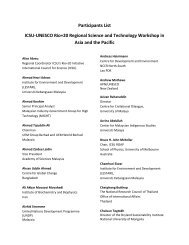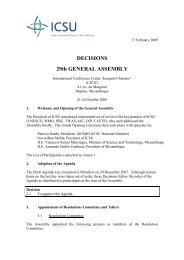Science, Traditional Knowledge and Sustainable Development
Science, Traditional Knowledge and Sustainable Development
Science, Traditional Knowledge and Sustainable Development
You also want an ePaper? Increase the reach of your titles
YUMPU automatically turns print PDFs into web optimized ePapers that Google loves.
18<br />
The Way Forward<br />
It is acknowledged in the introductory note to the <strong>Science</strong><br />
Agenda – Framework for Action of the World Conference on<br />
Sc i e n ce (Annex 1) th at modern science does not co n s ti tute<br />
the only form of knowledge available to further the development<br />
of humankind. <strong>Traditional</strong> knowledge systems harbour<br />
an enormous an d, for the most par t, un ta p ped we a l th of<br />
information that is acquired <strong>and</strong> constructed within a wide<br />
range of cultures. It is also acknowledged that these unique<br />
knowledge systems are increasingly weakened in the face of<br />
globalization <strong>and</strong> the growing dominance of a single view of<br />
the natural world as espoused by science.<br />
The va l u a ble co n tr i b ution to science th at has been made by<br />
tra d i tional knowledge sys tems was re cogn i zed at the Wo r l d<br />
Co n fe re n ce on Sc i e n ce. Fur th e r, the need to pres e rve, pro te c t,<br />
res e arch <strong>and</strong> pro m o te this empirical knowledge was advocated.<br />
To as s ure mutually be n e ficial <strong>and</strong> enriching exc h an g es<br />
be tween th ese two distinct knowledge sys tems re q ui res th e<br />
d evelopment of a way fo rward th at is based on two lines of<br />
a c tion. The fi rst co n cerns re co m m e n d ations for action with i n<br />
the scienti fic co m m un i ty to raise aware n ess abo ut the un i q u e<br />
va l u es of tra d i tional knowledge sys tems. The second area of<br />
a c tion th at must be pre d i cated on the fi rs t, co n cerns es ta bl i shment<br />
of a fo un d ation upon which to build par tn e rships th at<br />
can co n s tr u c tively co u ple science <strong>and</strong> tra d i tional knowl e d g e .<br />
Measures to be Taken by the Scientific Community<br />
Sc i e n tists <strong>and</strong> scienti fic insti tutions should pro m o te dial<br />
ogue <strong>and</strong> build aware n ess <strong>and</strong> un d e rs t<strong>and</strong>ing within th e<br />
s c i e n ti fic co m m un i ty abo ut tra d i tional knowledge <strong>and</strong> its<br />
relationship to science. Specifically, they need to:<br />
• Recognize that science does not constitute the only form<br />
of empirical knowledge about the world;<br />
• En co urage res e arch into the histo ry <strong>and</strong> ph i l o s o phy of<br />
s c i e n ce to identi fy <strong>and</strong> highlight the tan g i ble co n tr i b u-<br />
S C I E N C E, T R A D I T I O N A L K N O W L E D G E A N D S U S TA I N A B L E D E V E L O P M E N T<br />
tions that traditional knowledge systems have made to the<br />
development of science;<br />
• Raise aware n ess of the impo r tant disti n c tions be twe e n<br />
traditional knowledge, science <strong>and</strong> pseudo-science;<br />
• Re cogn i ze th at tra d i tional knowledge sys tems offe r<br />
unique <strong>and</strong> va l u a ble approa c h es to the acq ui s i tion an d<br />
co n s tr u c tion of knowledge, proces s es th at can only be<br />
a d d ressed by acknowledgement of the spe c i fic cu l tura l<br />
milieu within which they are reproduced;<br />
• Recognize that scientists are also influenced by their own<br />
cultures in which they learn, work <strong>and</strong> research;<br />
• Promote <strong>and</strong> support research into traditional knowledge<br />
systems that represent considerable stores of, as yet “undiscovered”,<br />
knowledge <strong>and</strong> potential for mutually beneficial<br />
exchanges with science.<br />
Actively support <strong>and</strong> strengthen the systems of acquisition,<br />
transmission <strong>and</strong> mai n te n an ce of tra d i tional knowledge in<br />
the societies that are keepers <strong>and</strong> developers of that knowledge.<br />
Specifically with respect to building appropriate bases<br />
to articulate equitable exchanges between traditional knowledge<br />
<strong>and</strong> science:<br />
• Un d e rs t<strong>and</strong> th at knowledge in tra d i tional soc i e ti es,<br />
contrary to an often held perception, is also dynamic <strong>and</strong><br />
constantly evolving;<br />
• Re cogn i ze th at th e re also exist tra d i tional proces s es of<br />
tran s m i tting <strong>and</strong> acq uiring tra d i tional knowledge, an d<br />
th at th ese proces s es des e rve to be mai n tained <strong>and</strong> supported;<br />
• Recognize, support <strong>and</strong> encourage research into the role<br />
of wo m e n ’s tra d i tional knowledge th at has often be e n<br />
neglected.<br />
UN ESCO, ICSU <strong>and</strong> other scienti fic bod i es should wo r k<br />
together to advocate <strong>and</strong> implement these measures.




